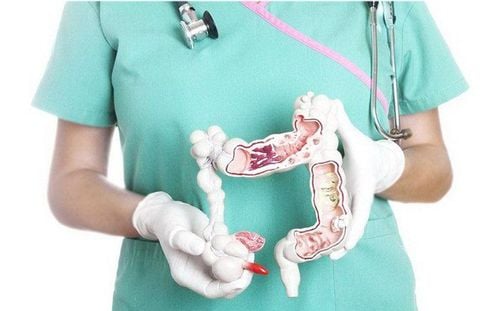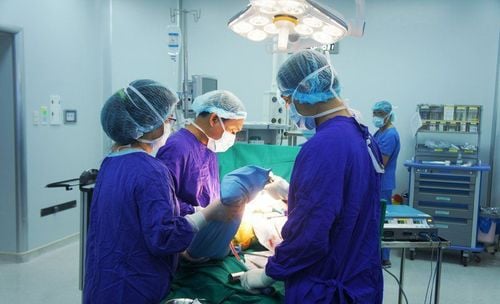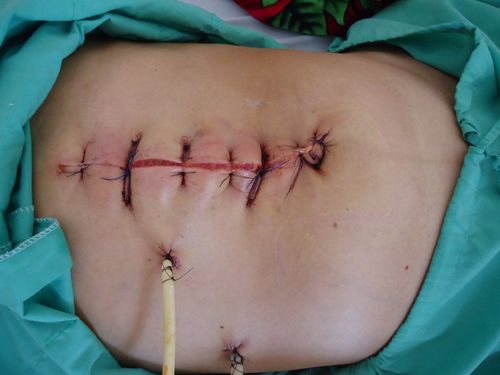This is an automatically translated article.
The article was professionally consulted by Department of General Surgery & Anesthesia - Vinmec Hai Phong International General Hospital.
Surgery is one of the surgical methods used to effectively treat a number of diseases. However, this is an invasive intervention, so patients often face a lot of complications after surgery, including bleeding after surgery. Bleeding after surgery is a complication after surgery that doctors should not ignore, affecting the patient's health and recovery, so it needs to be handled as soon as this condition is detected.
1. What are postoperative complications?
Although surgery can be an effective method in the treatment of the disease, it still exists some postoperative complications that cannot be avoided by the patient. Complications after surgery are often very diverse and different for each patient, each surgical method... Here are some postoperative complications that patients may have:
Post-operative wound pain: Depending on the surgical site as well as the size of the incision, the total amount of tissue that the patient has to remove during surgery and the patient's general condition before surgery, the pain level will vary. To treat this condition as quickly as possible, the patient can use pain relievers to temporarily relieve the pain. Fatigue: After surgery, especially major surgery in the abdominal and chest organs, patients often feel fatigued after surgery for a period of 2-4 weeks. Anorexia: When under anesthesia for surgery, it can leave anorexia complications in the patient, causing the patient to lose weight in a short time.

Swollen incision: It is caused by an inflammatory reaction around the wound that causes the incision to swell, which will then stop when the incision has healed. Incisional discharge: A foul-smelling discharge around the incision, and redness and heat around the incision are signs of an infection. Bruising, numbness around the incision: The cause is explained by blood leakage under the skin, special attention should be paid when bruising is accompanied by swelling and edema. Numbness around the incision is caused by the cutaneous nerves that have been removed during surgery, so it will cause numbness for a while. Postoperative bleeding: This is a postoperative complication that does not affect the patient's life, but should not be ignored and should be immediately reported to the treating doctor when there are signs of postoperative bleeding. Post-operative infection: The most common sign of infection is that the wound is swollen, hot, red, painful, may discharge and the patient may have a fever. In severe cases, there may be a collection of pus around the wound and at this time it is difficult to successfully treat with antibiotics. Therefore, when there are signs of infection, the patient should immediately notify the medical staff. Lymphedema: A common postoperative complication in patients undergoing lymphadenectomy. Disorders of some organs in the body, especially in the vicinity of the surgical site.

2. Bleeding after surgery
Bleeding after surgery is considered one of the postoperative complications that should not be ignored. The cause of postoperative bleeding is that during surgery, it is necessary to invade some parts of the body to remove part or all of the lesions that affect the patient's health. This will have to affect the blood vessels of these organs, causing blood loss during surgery. In most cases, blood loss during surgery will not affect the function and functioning of the organs in the body, but some surgeries can cause the patient to lose a large amount of blood, possibly due to special features. The point of the surgical interventional organ or the size of the large surgical section led to postoperative bleeding.
Postoperative bleeding is classified into 2 main types: bleeding that can be seen by the eyes, including bleeding from the incision, bleeding from the muscle, bleeding under the skin and bleeding that is not noticeable, which is bleeding from the inside. organs inside the abdomen and inside the pleura. Typical clinical symptoms of postoperative bleeding are that the patient feels thirsty, the body temperature drops, causing the patient's skin to feel cold, pale mucous membranes, abnormally low blood pressure, and dizziness. dizziness, lethargy... At the same time, when the above signs are present, the patient will be assigned to do paraclinical tests to check, in which there is a typical sign of bleeding after surgery, which is the result. Blood test results showed decreased Hct. If the patient has suspicious signs, it is necessary to immediately notify the medical staff and the treating doctor to monitor the risk of postoperative bleeding.

The first thing to do when the patient shows signs of bleeding after surgery is to bandage the bleeding site with a clean and dry bandage, then notify the treating doctor for further indications. according to. To handle this situation, after surgery, the patient will receive a blood transfusion as prescribed by the doctor, that's why before every surgery, the patient needs to have a blood group test to be able to find the compatible blood group. prefer to transmit as needed. It is important to always monitor the patient's vital signs in the postoperative period including pulse, breathing rate, temperature, blood pressure to early detect and handle bad developments after surgery.
Complications after surgery are often very diverse and complicated depending on the type of surgery, the size of the wound as well as the patient's body. In addition to other common complications, bleeding after surgery is a phenomenon that requires prompt treatment so as not to affect the blood supply to organs in the body. Therefore, as soon as the temporary bleeding stops after surgery, the medical staff should immediately notify the treating doctor for appropriate treatment for each patient.
Vinmec International General Hospital with a system of modern facilities, medical equipment and a team of experts and doctors with many years of experience in neurological examination and treatment, patients can completely peace of mind for examination and treatment at the Hospital.
Please dial HOTLINE for more information or register for an appointment HERE. Download MyVinmec app to make appointments faster and to manage your bookings easily.













